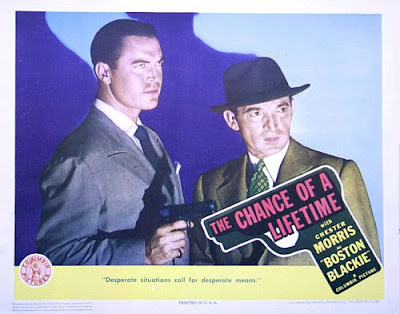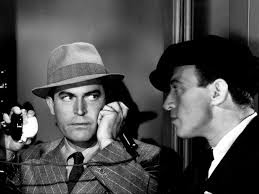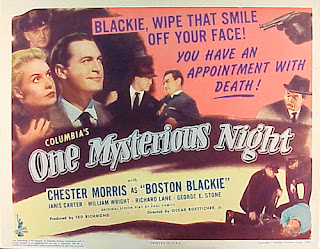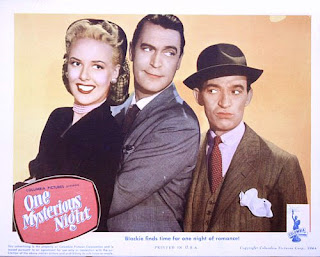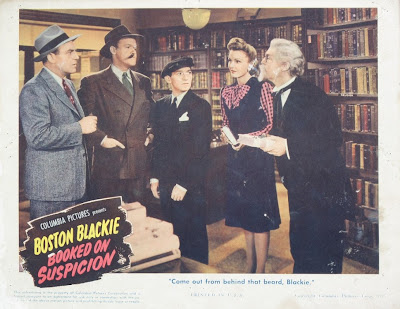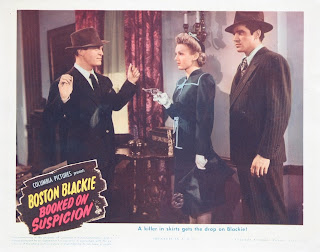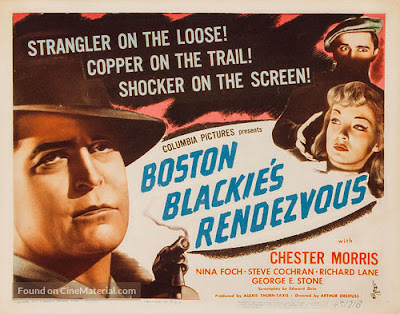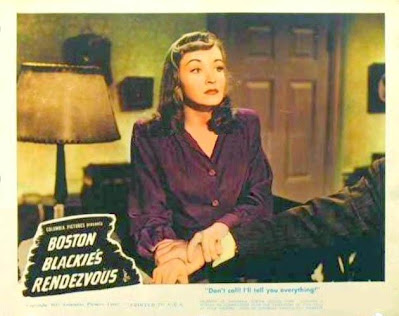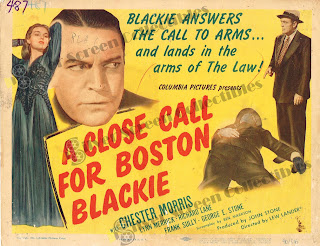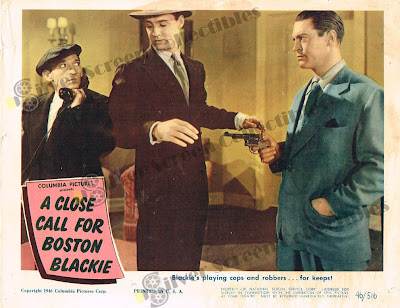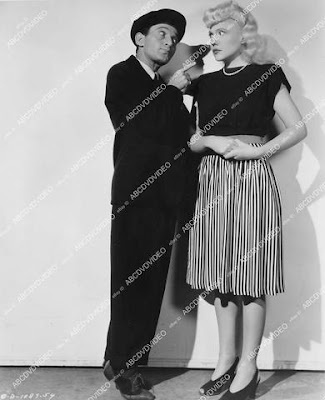Boston Blackie -
Films 6 - 10
The Chance of a Lifetime (1943) – 5.0
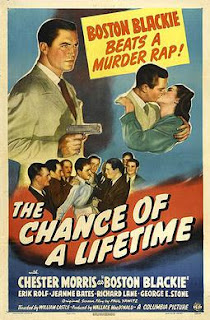
Go hide in a donut says the thug to The Runt. One of a lot of snappy lines
in this sixth in the Boston Blackie series. There were fourteen of them produced
by Columbia between 1941 and 1949 starring Chester Morris as Blackie. There
were also a bunch made prior to that going back to 1918 with Lionel Barrymore
portraying him one time. Not sure if any of those films survived. Giving
them a slight tinge of authenticity is that they are based on the stories
of Jack Boyle, who was serving a sentence in jail when he wrote them for
passing bad checks. He was also an opium addict as was Blackie in the early
short stories. It is hard finding much information about Boyle after Blackie
- did he get rich from the books, films and radio? Did he go back to opium?
He just seems to have disappeared off the grid.
This isn't one of the better films in the series - there is no mystery for
one thing and it is replaced by a few comic set pieces - Blackie and his
man pretending to be carpet cleaners to fool the foolish cops, a nice bit
with Blackie and his man who get stuck in a dumbwaiter while one set of cops
pulls them up and another set pulls them down and then they disguise themselves
as old cleaning ladies to break into the cops safe. The cops as is traditional
in so many of these films do not come off well! But there isn't much else
going on.
Interesting premise though - it is 1943 and there is a shortage of men with
skills at home and so Blackie convinces the Governor to release a group of
prisoners to work in his millionaire friend's factory and to live at Blackie's
apartment. One of them though gets into trouble immediately and kills a man
in self-defense and Blackie is blamed by Farraday as he always does. This
is William Castle's debut as director - better films ahead for him.
One Mysterious
Night (1944) – 5.0
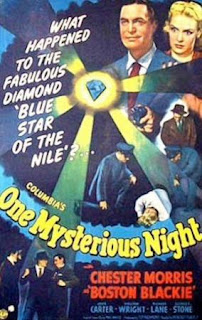
A few years ago I picked up the DVD set of all these Chester Morris Boston
Blackie films and thought it was time to plough through a few of them. No
one would confuse them for great cinema or even good cinema - passable cinema
at best as in if you want to pass an hour with an unchallenging film this
is a decent option. At about an hour apiece, think of it as binge-watching
a TV series. The same four or five characters show up in all of them like
TV as well.
This one deals with diamonds again - Blackie was an ex-jewel thief - this
time the Blue Diamond is stolen at an exhibit in a room full of people and
cops. Instead of accusing Blackie as Inspector Farraday normally does, he
recruits him to find the diamond. Blackie is soon on the trail but a nosy
parker female reporter (Janis Carter) is on his trail not knowing he is working
for the police and causes all sorts of problems. He immediately suspects
it is an inside job and the gum under the table points to the Asst. Manager
Daily who has a pretty sister. The brunette sister can go by practically
unnoticed at this very early point in her career and she goes uncredited
which just seems mean. Later she would go platinum blonde and as Dorothy
Malone she was in many good films. But to noir film fans she is the bookstore
clerk who Bogart takes a fancy to in The Big Sleep.
Also of note - more so than the film - is the directorial debut of Oscar
Boetticher Jr - later credited as Budd Boetticher who in the 1950's directed
some of the best Westerns ever with his favorite actor Randolph Scott. So
the last Blackie film had William Castle's directorial debut and this one
Boetticher's. So many of them started off in B films as the studios tested
them for speed and efficiency - bringing in a film on time under budget and
also as a learning experience. Some moved up, many just got stuck in B films
for most of their career and many were eased out. Boetticher kept making
B films for the rest of the 1940's but once the 50's came, he found his métier
in the Western and the few times he moved out of the genre with films like
City Beneath the Sea, The Magnificent Matador and Legs Diamond, the films
just didn't seem as good. He had the feel of the West down.
Boston Blackie
Booked on Suspicion (1945) – 5.0
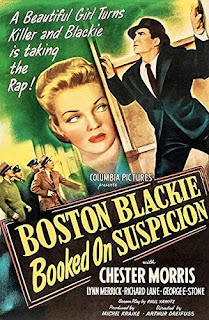
Watching four of these Boston Blackie films probably isn't a smart thing
to do - not that they are bad on an individual basis but you begin to realize
how they repeat the same schtick time after time. Blackie gets caught by
the cops; he escapes through the stupidity of the cops. His sidekick says
something out of school giving away too much information. Inspector Farraday
always thinks the guilty party is Blackie only to be shown he isn't time
after time after time. Farraday's assistant is a bumbling nitwit in each
episode. Blackie catches the bad guys and they turn the tables and then the
bad guys catch Blackie only to have him turn the tables. In pretty much every
film.
It isn't a jewel robbery for once - it is a fake rare book that is sold and
Blackie's friend is responsible for paying the buyer back $50,000. Blackie
spends much of the film disguised as an old man when he doesn't disguise
himself in blackface as he did only 2 films previously. It doesn't
take a genius to figure out the brains behind the forgery is the sweet blonde
bookstore manager (Lynn Merrick) though Blackie isn't very sharp in this
one missing clue after clue but how could that face be bad. Merrick is a
beauty - of course there were so many blond beauties that got funneled through
the studio systems and she never broke free from the B films. First signed
to RKO she made loads of Westerns co-starring with Red Barry and then with
Columbia for more B films - three with Boston Blackie as different characters.
Her husband and partner is played by Steve Cochran, later a tough guy in
many films - this is his debut.
It isn't a bad film - lots of twists and turns - a plenty of escapes crammed
into 60 minutes but it is time to give Blackie a rest for a while.
Boston Blackie’s
Rendezvous (1945) – 4.5
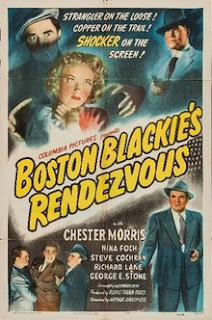
Chester Morris who played Boston Blackie for the 14 films of the series said
in an interview years after that he hated being Boston Blackie. Easy to understand.
He was Blackie on the radio and then in this series from 1941 to 1949. He
felt that it ruined his career being stuck as this character. Hard to say
- he made other films as well during this period and many before it. He just
has the makings of a B film actor about him - charming, fast talking but
not a great deal of depth. Of course, a film like this one probably didn't
help his attitude. It is ok with some idiot bits that go for humor but when
he and his sidekick the Runt do a blackface routine it is like walking on
a land mine. It just explodes. They pretend to be two black hotel maids
who act like loonies and a real black porter meets them and is fooled by
them. Good grief. And then the film ends with a quick reprise. I understand
that times have changed and I try not to be too judgmental about the old
films but this was really wretched.
It starts off with some style though. Blackie and Runt (George Stone) are
sleeping in single beds when they get a frantic knock on the door. It is
their friend Arthur Manleder who asks Blackie for help. He tells Blackie
that his cousin has escaped from an asylum after almost choking a nurse to
death. He wants Blackie to find him which turns out to be easy since he is
in the next room and tries strangling Blackie to death. Tip - don't turn
your back on a strangler. Jimmy is a charming fellow, well-spoken, good manners
until something clicks in his brain and he turns into a psychotic killer.
Everyone has their faults.
In particular, he is interested in a girl that he has been sending letters
to and wants to meet her. She works at a dance hall - ten cents a dance -
and is played by Nina Foch. A murder takes place. Inspector Farraday (Richard
Lane) of course thinks Blackie is the killer because . . . why not. Kind
of idiotic and there is plenty more in that vein. The Runt who has been cool
in previous films becomes a nervous-nelly in this one to an irritating degree.
Like Abbott in a ghost movie. Best part of the film is Steve Cochran as the
killer who smoothly moves between being a perfect gentleman and a wide-eyed
killer.
Boston Blackie’s
Close Call (1946) – 4.5
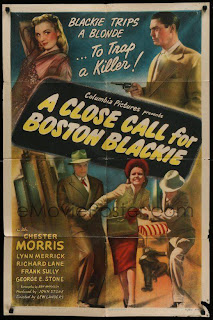
I've reached the tenth film in the Boston Blackie series - four more to go.
Hopefully, better than this one. One of my rules towards any film is when
they bring in a baby and have a hundred reaction shots from said baby, you
have a lemon on your hands. I expect the baby is making a guest appearance
and won't make another. The poor kid doesn't even get a credit after all
that hard work. They must have spent a day just filming this gurgling brat
to get the expressions they needed - happy, sad, curious, puzzled, shit in
my pants. Damn, I hate children in films. Child actors should have been run
out of Hollywood. Except Judy, Deanna and Rooney. They could stay. Anyways,
the cast is all back - Chester Morris as Blackie, George Stone as The Runt
and Richard Lane as Inspector Farraday. After nine films, why change anything.
Blackie and the Runt come home to find an old love of Blackie's getting beaten
up by two men on the street. He rescues her and takes her upstairs to find
the demon baby on his bed like an escaped nightmare. All happy and giggling.
It's a trap. Gerry (Lynn Merrick) explains its her baby from her husband
who was sent to the slammer but is now out. She needs help. My femme fatale
antennas raise immediately, What mother would leave her baby on a bed and
go downstairs to wait for Blackie. Blackie isn't as smart as I am. It's a
scam to get dough from her husband's rich father. who has disinherited his
son for marrying this woman. A few people get in the way. They find their
way to the morgue.
Merrick is all soft eyes and softer lips - a blonde looking for trouble.
The highlight of the film is another dame though, Claire Carlton, the Runt's
moll. She is a stick of dynamite. Funny and cute. Interestingly, after divorcing
Conrad Nagel she married Robert Goelet Jr. the heir to some fortune. Or he
was till he married Merrick. His father disinherited him because of the marriage.
Life imitating film.
